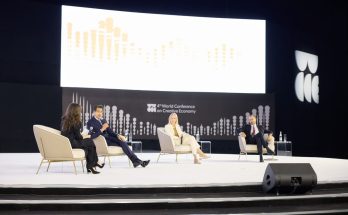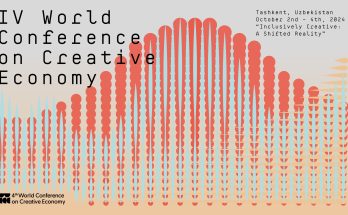 PARIS: India’s soft power glowed on a radiant spring morning in Paris. Yoga, sustainable development, cultural connections, the transformative power of education and the spirituality of Sri Aurobindo vied for the attention of a mixed audience of the French and the Indian community as Prime Minister Narendra Modi spoke at the UNESCO headquarters in the French capital.
PARIS: India’s soft power glowed on a radiant spring morning in Paris. Yoga, sustainable development, cultural connections, the transformative power of education and the spirituality of Sri Aurobindo vied for the attention of a mixed audience of the French and the Indian community as Prime Minister Narendra Modi spoke at the UNESCO headquarters in the French capital.
Amid chants of Modi, Har Har Mahadev and Vande Matram, the Indian leader, dressed nattily in bandgala suit, walked inside the UNESCO headquarters and unveiled his vision of an empowered India animated by universal education, religious pluralism, modern technology and harmony of man with nature.
He began his visit April 10 to the UNESCO headquarters by paying homage to the statue of Shri Aurobindo, India’s sage-philosopher-poet, and lauded his “belief in the unity of individual consciousness with the world outside.”
 “There is much that we can learn from his humanism and spiritualism, from his belief in the unity of individual consciousness with the world outside; the enlightened purpose of education; the service of science; and, the unity of world, founded on national freedom, diversity of civilizations and autonomy of culture,” Mr Modi said.
“There is much that we can learn from his humanism and spiritualism, from his belief in the unity of individual consciousness with the world outside; the enlightened purpose of education; the service of science; and, the unity of world, founded on national freedom, diversity of civilizations and autonomy of culture,” Mr Modi said.
The overarching motif of the Indian prime minister’s UNESCO speech was the power of culture to unite and nurture the human spirit and civilisations.
“Culture must connect, not divide, our world,” he said in the French capital. “It should be a bridge to greater respect and understanding between people. It should join nations in peace and harmony.”
“Across India’s neighbourhood, Asia and Indian Ocean, we are retracing our cultural connections to form a closer bond of friendship in this dynamic region,” he stressed.
The Indian leader’s words “deeply resonated” with the audience, as Irina Bokova, the UNESCO director-general said.
Yoga Power & Climate Change
 Launching a website on yoga, designed by Tech Mahindra, Mr Modi reminded the audience about the redemptive powers of yoga and its underlying philosophy of harmony of man with nature. In a speech reminiscent of his address at the United Nations General Assembly in September last year, Mr Modi linked yoga with challenges of combating climate change and advocated a change in lifestyles.
Launching a website on yoga, designed by Tech Mahindra, Mr Modi reminded the audience about the redemptive powers of yoga and its underlying philosophy of harmony of man with nature. In a speech reminiscent of his address at the United Nations General Assembly in September last year, Mr Modi linked yoga with challenges of combating climate change and advocated a change in lifestyles.
“Yoga awakens a sense of oneness and harmony with self, society and Nature. By changing our lifestyle and creating consciousness, it can help us deal with climate change and create a more balanced world,” he said. In December 2014, the United Nations General Assembly heeded Mr Modi’s call and declared June 21 as the International Day of Yoga in a record time and record co-sponsors.
“It was not just an act of friendship for India. It reflected our collective ability to go beyond our familiar boundaries in search for solutions to common challenges,” he said.
His words should have a special connect with France, where yoga’s popularity is burgeoning by the day, and his linkage of yoga should also spark serious thinking months before Paris hosts the global climate summit.
Underlining India’s multifarious partnership with UNESCO in the fields of culture and education, Mr Modi spoke about his vision of India underpinned by universal education, skill development and digital governance.
Author Profile

- Manish Chand is Founder and Editor-in-Chief of India Writes Network (www.indiawrites.org) and India and World, a pioneering magazine focused on international affairs. He is CEO, Centre for Global India Insights, an India-based think tank focused on global affairs.
Latest entries
 India and the WorldFebruary 17, 2026South-by-South: Focus on people-centric solutions at India AI summit
India and the WorldFebruary 17, 2026South-by-South: Focus on people-centric solutions at India AI summit India and the WorldFebruary 7, 2026Modi hails interim India-US trade deal, Goyal says no concessions made on agriculture
India and the WorldFebruary 7, 2026Modi hails interim India-US trade deal, Goyal says no concessions made on agriculture India and the WorldFebruary 2, 2026Trump announces trade deal with India, Modi ‘delighted’
India and the WorldFebruary 2, 2026Trump announces trade deal with India, Modi ‘delighted’ India and the WorldJanuary 31, 2026Palestinian minister bats for mediatory role for India in ending Gaza conflict
India and the WorldJanuary 31, 2026Palestinian minister bats for mediatory role for India in ending Gaza conflict







